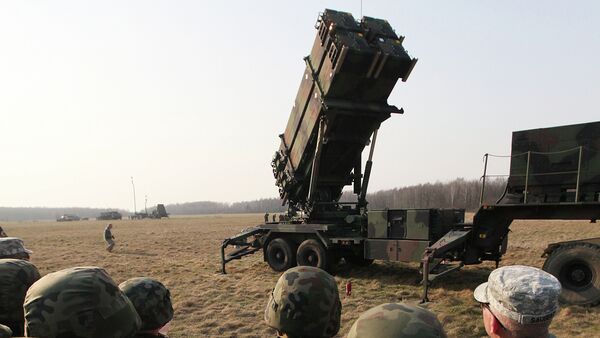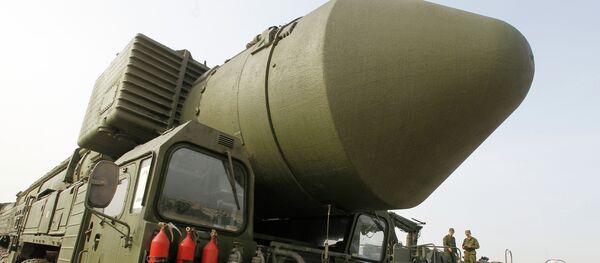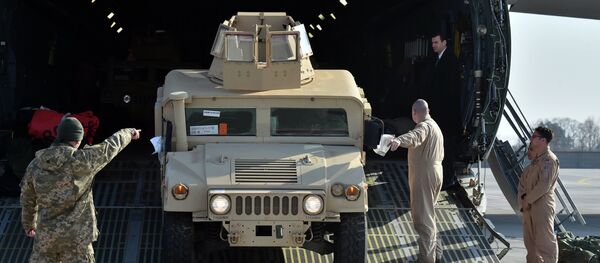Commenting on the announcement by Polish and US officials last month that the first elements of a US missile defense system will appear in northern Poland in 2018, Benedyczak noted that "if an increase in NATO forces' presence in Europe merely annoyed the Russians, the commentary about the missile defense system has driven them into a rage. Yevgeny Lukyanov, the Deputy Secretary of the Russian Security Council, warned on the same day the announcement was made that by placing elements of missile defense on their territory, Poland and Romania expose themselves to danger."
Lukyanov had made headlines last month by noting that if Poland and Romania "like being targets because of US weapons systems, that is their choice." And this, according to Benedyczak, is "not merely traditional intimidation."
'Not Just Russian Trolls'
The political scientist recalled that in 2001, on the brink of the US decision to withdraw from the Anti-Ballistic Missile Treaty, 50 US Nobel laureates had asked George W. Bush not to abrogate the treaty, "pointing not only to the shortcomings of American missile defense capabilities, but also to the danger of creating a new arms race."
Benedyczak recalled that Nobel laureates also made a similar appeal to Barack Obama in 2009, their letter noting that the ineffective system "could contribute to unwise decisions by US policy makers, [and] would continue to undermine relations with Russia, whose cooperation is key to making progress on a range of important security issues, including nuclear arms reduction and halting the Iranian nuclear and missile programs."
Benedyczak explained that just last month, Deputy Director of the US Missile Defense Agency Kenneth Todorov admitted that the US "can't keep buying multi-million-dollar interceptors to shoot down adversaries' ever-growing arsenals of much cheaper offensive missiles." According to Benedyczak, Todorov's statement effectively constituted "acknowledgement that the system needs major reform, because it cannot guarantee security."
The academic noted that unfortunately, "leading Polish media do not tell the truth about the missile defense system's intentions. The real long-term goal of the [US] missile defense system is aimed at limiting Russia's nuclear potential and, in the future, possibly that of China as well." Benedyczak recalled that a few years ago, Polish Colonel Eugeniusz Janula wrote a brilliant expose explaining that "only a fool could believe that Kim Jong Il would send his rockets…through Poland to the US," while "Iranian missiles would have to fly an extra 2,500 km, turning from an optimal route over the North Pole in the direction of Poland in order to allow themselves to get shot down there."
Scorpions in a Bottle
The political scientist noted that "the plan of the Americans, even though they strongly deny it, implies the possibility of intercepting Russian nuclear missiles, so that they will not be able to reach US territory. And then the USA will become the world hegemon, able to impose its will, and not just against Russia. It is indicative in this regard that the US refused Moscow's proposal to accept the deployment of elements of a missile defense system in Poland, in exchange for an agreement with Washington promising not to use the system against Russia."
However, according to Benedyczak, "the American plan has one flaw: The Russians, (and others, including China, India, Britain, Pakistan and France) are not just going to sit back and wait to see what [Washington] comes up with. And the crux of the matter is this: It was the Americans who have reawakened the spirt of the arms race with this project, but the Russians and the Chinese will do everything in their power to ensure that the Americans do not gain the status of a nuclear hegemon."
US Missile Defense Puts Poland Between a Hammer and an Anvil
"Poland's active participation in NATO projects is one thing, but participation in the [nuclear] arms race can be likened to putting our heads between a hammer and an anvil. In case of an (inevitable?) confrontation between Russia and the United States, we will be one of the first targets of Russian missiles. There will be nothing left of Poland, which will become the center of a collision between two nuclear powers."
Benedyczak argued that he completely disagrees with Prime Minister Ewa Kopacz's recent commentary that Polish security is "close to Washington's heart," noting that "the US is a very pragmatic state, and always has its own interests and conflicts [in mind]. Poland is simply a tool in its hands. It wouldn't be a bad thing if our own country had 'America's levels' of pragmatism."
"And it's not a question of becoming subservient to Russia. The missile defense system which has been so fetishized by Poland simply will not be able to protect us; it is imperfect, and the Russians will bypass it…The only logical outcome resulting from the creation of the American system in Poland will be that we will end up on the front lines, waiting to turn into the Christmas ham."
Dangerous Precedents
"Poles have been driven to a fever of excitement in their admiration of NATO's military force, and over the feeling that Russia must be 'put in its place'. When a column of American armored vehicles and Hummers crossed into Poland, the streets were filled with happy people, and the media triumphantly reported on the allied army's show of strength."
In Benedyczak's view, this situation "creates a dangerous psychological condition in peoples' minds. The Russians are religiously convinced that the Americans and their allies want to destroy their country, feeling the need to defend themselves. From their point of view, their country's rearmament is only a response to the Western threat. The US and the EU, meanwhile, adhere to a discourse on the 'unpredictable Mr. Putin', capable of blowing up the world, and who must be stopped. From our point of view, rearmament is also a response to the threat posed by the enemy. As a result, both sides are beginning to think more and more calmly about the idea of an armed conflict, while the media works to create an atmosphere presenting 'the other side' in an ugly and caricatured way."
Benedyczak warned that "this is exactly the same situation we dealt with prior to the First World War." Ultimately, he noted, "the US and Europe on the one hand, and Russia and its allies on the other, are gradually approaching the point where no one remembers what the conflict was all about. The only thing that matters is to bring the enemy to his knees…[And] when it comes to nuclear weapons, it doesn't matter who started it; what's important is where it may all lead."
Poland Must Regain Its Instinct for Self-Preservation
Benedyczak concludes his article by noting that "for the second time in their history, Poles have lost the purely animal instinct of self-preservation, no longer feeling any fear of nuclear weapons, which will soon be sent to Pomerania…Ballistic missiles armed with nuclear warheads will appear in the Kaliningrad region, just over 150 km from Gdansk, and will be aimed at our own, absolutely defenseless territory."
The political scientist notes that "the agreement on building missile defense in Poland could bring Poland to an even greater catastrophe than the one which occurred in 1939. In the event of war, we will face not occupation or the loss of our independence, but complete destruction, and here insurrections and clandestine schools would no longer be of any benefit."
Citing 20th century philosopher Erich Fromm's argument that societal nonchalance toward the threat of nuclear annihilation signifies a love of death, Benedyczak concludes his piece by asking whether "the animalistic fear of death can overpower our current necrophilia."







